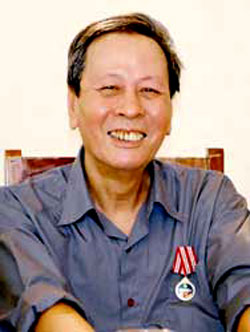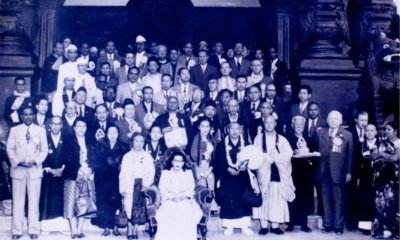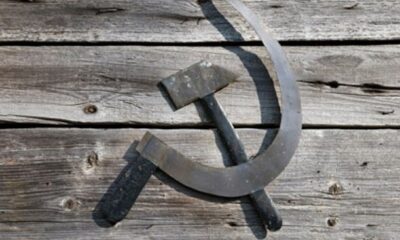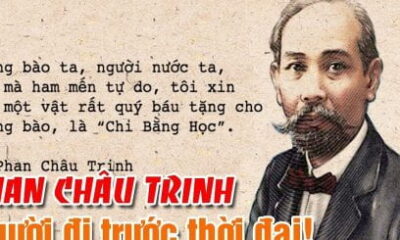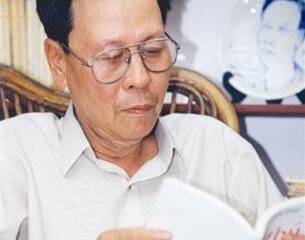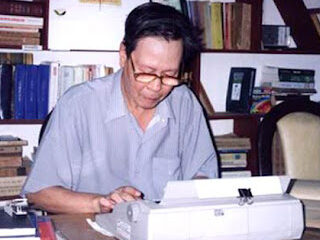Editor’s Note: The following excerpt is from a memoir by the esteemed writer Nguyễn Mạnh Khải (1930-2008), celebrated as one of the foremost literary figures in communist Vietnam. His lifetime was marked by numerous accolades, including the Le Thanh Nghị Literature Prize (Regional Level III, 1951), the Vietnamese Arts and Literature Prize (1951-1952), the Vietnamese Writers’ Association Prize (1982), the Southeast Asian Literature Award (2000), and the prestigious Ho Chi Minh Prize for Literature and Art (2000). Originally penned in Vietnamese and published posthumously in 2006, this collection has been translated by our editor Vinh Phu Pham. The memoir will be presented in six installments.
Political Essays – 2006
Nguyễn Khải
10.
Due to the lack of understanding of individual human beings, or merely understanding them through mechanistic, reductionist analyses of 19th-century materialism, the new socialist societies dared to set ambitious goals for human transformation within decades if the social environment changed. Hence, writers are called “engineers of the soul”!
Literature, created by humans, is meant to be freely given, with minimal constraints. Only literature respects every personal value, every individual’s choice, even their irrational prejudices. They have the right to love or hate themselves, to honor or curse themselves; it doesn’t matter. Writers keep writing, haters keep hating, even if it means the right to throw books into the fire.
The purpose of “enlightening” and “educating” through literature is never revealed, because revealing it is bad literature. Moreover, the writers themselves don’t have that intention. They write with their genuine emotions, sharing their painful experiences. They write for themselves first and then for readers. Sometimes, they don’t even think about the readers, they write for the sake of writing, to relieve their sorrow and console themselves, shedding tears in solitude. No one blames anyone, gets angry, or condemns anyone.
Because there’s no barrier when we read, the meaning of the work naturally seeps into the crevices of our melancholic thoughts, our secret desires, lingering there, gradually permeating into our spiritual world unconsciously. This helps us discover a new and unfamiliar realm of light, cleanse some prejudices, alter some beliefs, and we blissfully believe that we have actively changed on our own, absolutely not following the guidance of anyone, any theory, or suddenly succumbing to any contemporary trend.
Anything unfamiliar to our nature, our habits, even saying one word, with everything that has formed our personal history, sooner or later, it will be expelled so that we can return to our original state. I heard of a patriotic priest who was invited by the revolutionary regime to work in the resistance during the fight against the French. When alone, he would feel melancholic because there was no church in the forest for him to pray and conduct services. He remembered God, his congregation, and the words spoken between God and his congregation in his daily work.
As he neared his end, he earnestly requested a priest from a certain parish he was attending to baptize and anoint him with the Holy Oil. Another story, when I had the chance to interact with a high-ranking Party leader while he was still in office, I once thought he was a model for a future society, focusing on nothing about himself, all for the nation, for the cause, for the people. However, he was later removed from his position because he wasn’t re-elected to the central committee of the Party, a surprising development for many.
Upon learning the election results, I heard he burst into tears, and for years after, he quietly wept, avoiding going out, avoiding everyone, as he believed he had been humiliated, had lost all honor. Another person, once less prominent, once wore a thick layer of ivory, but when the ivory was peeled off, only then was the true person revealed. The person who wears many layers is a fake person; the person who has shed all layers is the true person.
The true core can always change, but to change it might take nearly a lifetime. That’s to say it’s only possible to change, not to guarantee that change will happen. This is because people are unwilling to change according to prescribed standards or income growth per capita. Human development towards positivity greatly depends on a free and democratic living environment, allowing it to assert itself, awakening all its potential for creativity that’s budding within.
11.
In half a century living under the leadership of a Party adhering to Marxist-Leninist theory, I have always been reminded to respect the masses. The power of the masses can alter the course of history and the destinies of many individuals. Ironically, no republican regime in the 20th century has dared to underestimate the masses as in socialist societies. Living within this system for several decades, there hasn’t been a single organized protest against any state policy. Not during the land reform era or when farmers were mobilized into agricultural cooperatives.
State enterprise directors embezzled, workers’ living standards declined, yet no strikes occurred. Farmers oppressed by authoritarian figures, engaging in illegal activities, were suppressed as soon as they displayed discontent. The leaders astutely realized that our people are very good, easy to manage; any sudden disobedience must be orchestrated by disgruntled retired officials. Focus on those officials, intimidate them, and if needed, arrest them on the spot. Truly, this is how it is.
Meaning, those in power disregard the people. They fear individuals who possess broad understanding and knowledge, who are hard to bully, and those who manipulate and instigate. Similar to the era when kings were still in power, they feared communists because they were instigators. Being in power in our country, then and now, people still live under an authoritarian regime. They never truly know what democracy is, what bourgeois democracy is. Once authoritarian, always authoritarian; what difference does it make whether it’s bourgeois authoritarianism or proletarian authoritarianism?
Communists are staunchly against individualism, yet it’s precisely from socialist societies that the deification of the individual emerges. Because the leaders of the doctrine are also leaders of the nation. They come to power not through elections but through the pre-existing trust of devotees in their spiritual leaders. Spiritual leaders are supremely divine figures, transcending worldly constraints. They wield power indefinitely because they must serve the people until death. They are above criticism, and no one dares criticize them, for they symbolize the nation, the ruling Party, standing above the constitution and all laws.
They possess complete freedom compared to the presidents of other democratic nations. The lower levels, from central to local, are the most liberated within their respective domains, becoming the lords of their territories. No one dares infringe upon them if they want to retain even a modicum of their own freedom. A society with millions of uncounted individuals, not respected, while a small group is exalted and fully satisfied in all their needs — what kind of society is this, a model society for future generations?
Uttering these bizarre stories is already difficult to hear, let alone putting them into writing without feeling embarrassed. Embarrassment aside, if you lay down your pen, what will you use to provide for your family? To think about sustenance, you have to forget everything and sell yourself completely to authority. After the reunification of the country, meeting writers, journalists, and artists of the old regime, they appeared excessively comfortable, lively in their speech, and expressive in their gestures, as if they had never feared anyone.
As for myself, I fear many things: fearing to meet relatives, unsure if they’re related to the Americans; fearing to speak because whether it’s right or wrong remains uncertain. I even have to watch my facial expressions. Too much joy may make me lose vigilance, excessive praise might lead me to unconsciously indulge in the capitalist economy. Those in power are always on edge, their speech resembling one another, leading folks around here to mock them as “provincial.” Explaining this isn’t difficult. They are the products of a capitalist industrial economy. Even if colonial, they still belong to the capitalist system, free from many past constraints in thought and action.
As for myself, I’m a product of a feudal agricultural economy, not yet a master, but also not having ever savored the taste of true freedom and democracy! The gap is undeniable and can’t be bypassed or diverted. I, too, have tried to take a shortcut for decades, regretfully, history hasn’t recognized that path. I’m afraid that one day history will punish me for the sin of wanting to be wiser than history, of wanting to deceive history!
12.
All communist parties consider criticism and self-criticism as the most effective means to address internal contradictions. The motion of matter generates contradictions, resolving which allows the material to develop and progress. The negation of negation, a concept that sounds both scientific and mystical, akin to a mystical chant: “Open, sesame!” Reading it aloud, the door to the future seems to swing wide open. Yet, for half a century, socialist societies have been chanting this mantra, and the door to the future remains tightly shut. Has it lost its sacredness? Truly, it has lost its sanctity because those heralding it do not believe in its miraculous potential.
If they believed in criticism and self-criticism, Stalin would not have orchestrated politically-motivated trials to eliminate opponents who were his right and left hands during those years. If they believed in that magical chant, Mao Zedong would not have unleashed the “Cultural Revolution” to eliminate anyone daring to obstruct his adventurous schemes. This pertains to those holding the highest positions of power. Even those holding lower levels of power never truly embrace this romantic approach. Within party committees, they engage in self-criticism and criticism with feigned enthusiasm. Everyone feels better after these joyous confessions and absolutions.
Bad habits and even crimes continue to persist, as do the forbidden zones that only the thoroughly dispirited dare to trespass. Thus, when the General Secretary of the Party was newly elected, amidst the fervor of renewing party activities, he initiated a movement of self-criticism and criticism throughout the entire party. Party units nationwide responded fervently, repeating with genuine enthusiasm in their high-spirited speeches, rarely seen in their highly partisan rhetoric. It was a colossal performance, costly and without any meaningful results. It was just a show, where old and new actors all played their roles adeptly.
In the end, those with guilt became more aggressive and confident, while those who accused became more hesitant and fearful. Peculiar, isn’t it? Adherents of Marxist theory believe that societal environment and personal circumstances decisively influence the formation of human character. A region with numerous positive revolutionary movements will undoubtedly give rise to many good collectives, and good collectives will produce many good individuals. Humans are material entities, thus they cannot escape the material conditions that allow their existence. Yet, they are also biological and spiritual entities, encompassing culture, personal history, and ancestral lineage.
They cannot fully know themselves, nor can they fully comprehend the unpredictability within themselves when encountering contradictions in life. Therefore, the realm of the human psyche, the world of thoughts, is incredibly diverse and complex, with countless winding paths. Since the dawn of language, writing, and literature, humans have bemoaned not knowing much about themselves and their peers. Humans remain an enigmatic and profound mystery, just as they were in primordial times. Communists must possess great arrogance to engage in the artifice of instructive criticism, for it requires a deep understanding of the most elusive aspect of human nature. It is transformative, ephemeral like clouds and wind.

 Politics & Economy3 years ago
Politics & Economy3 years ago
 Society & Culture4 years ago
Society & Culture4 years ago
 ARCHIVES4 years ago
ARCHIVES4 years ago
 Politics & Economy3 years ago
Politics & Economy3 years ago
 Politics & Economy4 years ago
Politics & Economy4 years ago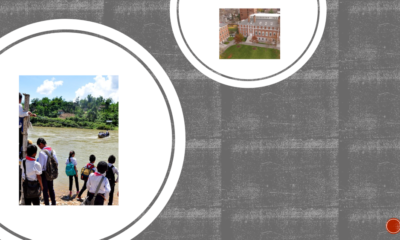
 Politics & Economy3 years ago
Politics & Economy3 years ago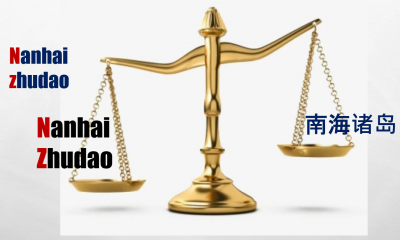
 Politics & Economy4 years ago
Politics & Economy4 years ago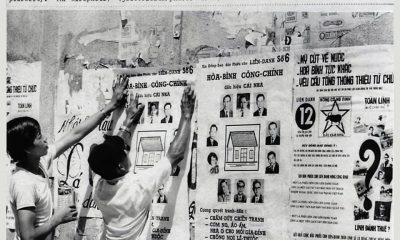
 ARCHIVES3 years ago
ARCHIVES3 years ago
